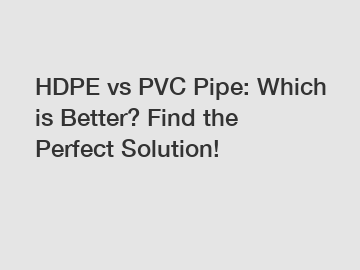HDPE vs PVC Pipe: Which is Better? Find the Perfect Solution!
Goto SINCO to know more.
HDPE vs PVC Pipe: Which is Better? Find the Perfect Solution!
When it comes to choosing the right type of pipe for your plumbing or construction project, understanding the differences between HDPE (High-Density Polyethylene) and PVC (Polyvinyl Chloride) becomes crucial. Both materials have their own unique characteristics and advantages, but how do they measure up against each other? In this article, we will explore the properties, benefits, and potential drawbacks of HDPE and PVC pipes to help you make an informed decision.

1. Material Composition:
HDPE pipes are made from high-density polyethylene, a thermoplastic polymer known for its strength, durability, and resistance to chemicals. On the other hand, PVC pipes are composed of polyvinyl chloride, a synthetic plastic polymer renowned for its versatility, low cost, and ease of installation.
2. Strength and Durability:
HDPE pipes are exceptionally strong and flexible, making them suitable for a wide range of applications. They have high tensile strength and are resistant to impact, cracking, and abrasion, making them ideal for underground installations. PVC pipes, while still durable, are more rigid and prone to cracking under excessive pressure or impact.
3. Chemical Resistance:
Both HDPE and PVC pipes offer excellent resistance to a variety of chemicals. However, HDPE has a slight advantage in this aspect. HDPE is highly resistant to corrosive substances, such as acids, alkalis, and even some organic solvents. PVC pipes, although resistant to most chemicals, are more susceptible to damage from highly acidic or alkaline solutions.
4. Flow Capacity and Friction:
HDPE pipes have a smoother internal surface, resulting in reduced friction and improved flow capacity. The smooth surface of HDPE allows for efficient transportation of fluids, reducing energy consumption and maintenance costs. PVC pipes, on the other hand, tend to have a rougher internal surface, leading to increased friction and lower flow capacity.
5. Installation and Jointing:
HDPE pipes are lightweight and flexible, making them easier to handle and install. They can be fused together using heat, creating a seamless and leak-proof plumbing system. PVC pipes, while still relatively easy to install, require solvent cement or mechanical couplings for jointing. This might increase the chances of potential leakages.
6. Cost Considerations:
In terms of upfront costs, PVC pipes are generally more cost-effective compared to HDPE pipes. PVC is an affordable material with low production costs, which makes it a popular choice for plumbing systems. However, it's important to note that HDPE pipes may offer long-term cost savings due to their durability, resistance to corrosion, and reduced maintenance requirements.
7. Environmental Impact:
HDPE pipes are recognized for their eco-friendly nature. They are made from recyclable materials and can be melted and reshaped without losing their properties. Over their lifespan, HDPE pipes have a low carbon footprint and can be recycled multiple times. PVC pipes, although recyclable, can release toxic fumes during manufacturing and may contribute to environmental pollution when not disposed of properly.
In conclusion, determining whether HDPE or PVC pipe is better depends on various factors, including the specific application, budget, and environmental concerns. HDPE pipes excel in strength, flexibility, chemical resistance, and long-term cost-effectiveness, making them an excellent choice for underground installations or corrosive environments. On the other hand, PVC pipes offer affordability, ease of installation, and a smooth flow of liquids, making them more suitable for low-pressure applications or projects with budget constraints.
Ultimately, the "perfect solution" lies in carefully evaluating the requirements of your project and weighing the benefits and drawbacks of each material. By considering the points discussed above, you can confidently choose the right pipe that aligns with your specific needs and achieve effective plumbing or construction results.
Click here to get more.
The company is the world’s best HDPE gas pipe specifications supplier. We are your one-stop shop for all needs. Our staff are highly-specialized and will help you find the product you need.



